Lemon for Infants: Benefits, When to Introduce & Side-effects

- At What Age Can a Baby Have Lemons?
- Nutritional Value of Lemon
- What Are the Health Benefits of Lemon for Babies?
- Side Effects of Lemon on Babies
- How to Include Lemon in Your Baby’s Diet
- Recipe of Lemon Juice for Babies
- How to Buy and Store Lemons
- FAQs
Your baby will be eager to try out new tastes and textures when she starts on solids. You will want to include healthy fruits and veggies in her diet, but not all that’s healthy for an adult may not be healthy for your baby. In this article, we will talk about one particular fruit, i.e., lemon for infants.
Lemons can be introduced to a baby after their first birthday. It can be started even earlier, i.e., when your baby turns 10-months-old to see if she is sensitive to new foods and flavours. Lemons contain citric acid, and this can sometimes can be hard on the baby’s digestive system.
At What Age Can a Baby Have Lemons?
When the baby is about 10 months old you can start giving her diluted lemon juice. You can add a teaspoon of sugar in the beginning so that it is not very sour. But lemon slices should not be given to the child even if she is older than a year. This is because the enamel of the teeth might get damaged due to ascorbic acid which can increase tooth sensitivity (1).
Nutritional Value of Lemon
Lemon is an important fruit in the citrus group as it has so many health benefits.
| Nutritional components found in lemons |
Value (per 100 g) |
Nutritional components found in lemons |
Value (per 100 g) |
| Total lipid | 0.30 g | Niacin | 0.100 mg |
| Fibre | 2.8 g | Sugar | 2.50 g |
| Calcium | 26 mg | Vitamin E | 0.15 mg |
| Water | 88.98 g | Iron | 0.60 mg |
| Protein | 1.10 g | Vitamin A | 22 IU |
| Magnesium | 8 mg | Sodium | 2 mg |
| Vitamin B-6 | 0.080 mg | Zinc | 0.06 mg |
| Folate | 11 ug | Phosphorous | 16 mg |
| Carbohydrate | 9.32 g | Potassium | 138 mg |
| Riboflavin | 0.020 mg | Vitamin C | 53 mg |
| Thiamin | 0.040 mg | Energy | 29 kcal |
Source: IFCT 2017, Indian Council of Medical Research
What Are the Health Benefits of Lemon for Babies?
Giving lemon to babies (in the juice form) has certain advantages as it:
1. Provides Hydration
Lemon is an excellent choice to include in your baby’s diet during the summer. This is because lemon juice hydrates the body and provides it with essential vitamins and minerals.
2. Prevents Scurvy
This is a form of skin and oral disease caused due to a severe lack of ascorbic acid in the diet. Scurvy can be entirely avoided by taking two tablespoons of lemon juice mixed in a glass of water containing sugar.
3. Cures Digestive Problems
Lemon juice can reduce many issues related to the digestive system because the acidity of the juice has many anthelmintic properties that can kill intestinal worms. You can give this if your child has dyspepsia, constipation, and biliousness.
4. Controls Vomiting
Vomiting usually happens due to chronic indigestion, gastric reflux, and nervous disorders. This can be reduced by taking half a teaspoonful juice mixed with some sugar.
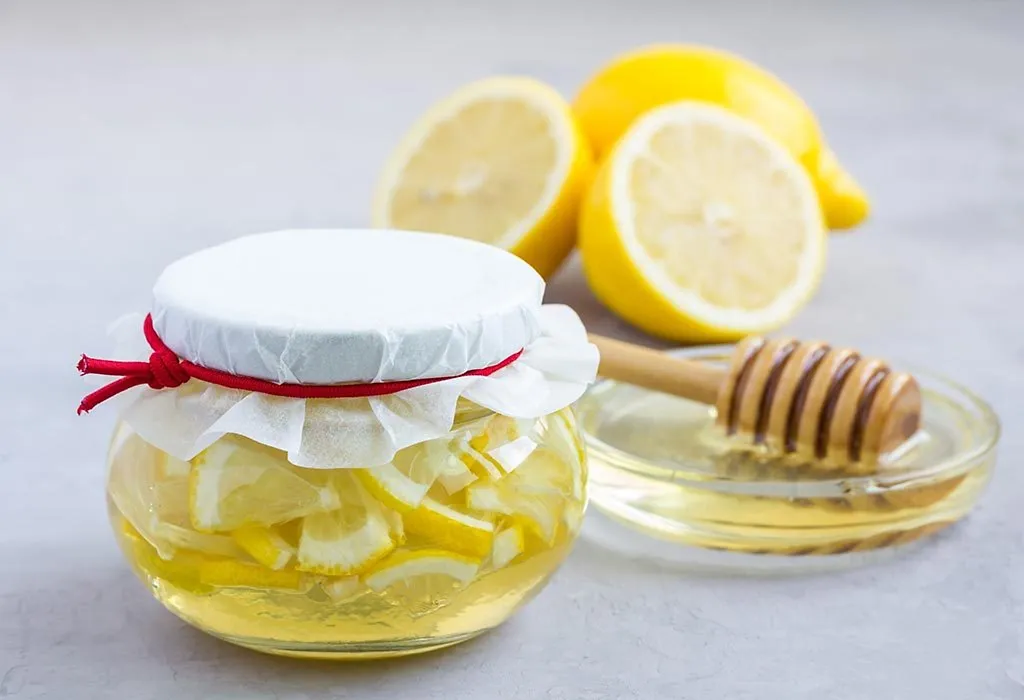
5. Controls Diarrhoea
Diarrhoea can be common in infants, and the first issue that requires your attention if your child has diarrhoea is to restore the body’s water level. You can treat this by feeding the baby a glass of water with a tablespoon of lemon juice with little salt and sugar.
6. Boosts Immunity
The immune system of children is not that developed so they are more susceptible to illness. This can be avoided by taking lemon juice regularly since Vitamin C in lemons strengthens their immune system.
Side Effects of Lemon on Babies
Lemon, while rich in vitamin C, can have some side effects when introduced to babies, especially in their early months. It’s important for parents to be aware of these potential issues before including lemon in their baby’s diet.
1. Acidic Reaction
The high acidity of lemon can cause discomfort in a baby’s sensitive stomach. This may lead to symptoms like stomach pain, gas, or even acid reflux, making the baby fussy and irritable.
2. Skin Irritation
Lemon juice can cause skin irritation, especially if the baby has sensitive skin. The acidic nature of lemon may lead to redness, rashes, or even a burning sensation when it comes into contact with the skin.
3. Citrus Allergies
If your family has a history of citrus allergies, avoid giving lemon to the baby until she is at least 1 year old. Take the baby to the doctor if there are rashes around the lips and mouth or diaper rashes after she has had some lemon juice (2). Always check the label for citrus ingredients when you buy commercial baby food preparations. Your baby might develop a tolerance for citrus fruits as she gets older. Until then, avoid citrus fruits. In fact, even before feeding the baby lemon juice for the very first time, it’s best to consult her paediatrician.
How to Include Lemon in Your Baby’s Diet
Lemon can be a healthy addition to your baby’s diet when introduced carefully and in small amounts. Its vitamin C content and refreshing taste can enhance the flavor of various foods. Here are some safe and creative ways to include lemon in your baby’s meals.
1. Diluted Lemon Water
Start by adding a few drops of lemon juice to a small amount of water. This helps your baby get accustomed to the taste of lemon without overwhelming their sensitive palate.
2. Mixed with Purees
Add a tiny bit of lemon juice to fruit or vegetable purees. This can enhance the flavor and add a touch of zest, making the puree more appealing to your baby.
3. Lemon-Infused Yogurt
Mix a few drops of lemon juice into plain yogurt for a tangy twist. This combination is not only delicious but also provides probiotics and vitamin C.
4. Lemon Rice
Once your baby is comfortable with solids, you can add a little lemon juice to cooked rice. This simple dish is flavorful and can be a gentle introduction to citrus.
5. Lemon in Baby-Friendly Soups
A few drops of lemon juice can brighten up the flavor of homemade soups or broths. Just make sure the soup is not too acidic for your baby’s taste.
6. Lemon Zest in Finger Foods
For older babies who are starting finger foods, you can sprinkle a small amount of lemon zest on soft foods like avocado slices or cooked vegetables. This adds a mild lemon flavor without the acidity of the juice.
Recipe of Lemon Juice for Babies
Fresh lime juice is great during summers, and it can be given occasionally to babies who are 8 months and older.
This recipe is perfect to be given to babies, toddlers, and kids. But little ones should be given only 100-150 ml of lemonade.
Ingredients:
- A small sized lemon
- Water – 1.5 cups
- A teaspoon of sugar
- A pinch of salt (optional)
Instructions:
- Wash the lemon thoroughly and cut it in half.
- Squeeze one half in a glass. Add water, sugar, and salt, and mix well.
Note
- You can adjust the sweetener.
- It is better to bring the lemon to the room temperature so that it is easier to squeeze. If in case your lemon has been sitting in the fridge for too long, microwave it for about 15 to 20 seconds.
- Ask your doctor before giving a new food to your baby.
- You can introduce this juice by providing small amounts to your child, and it is best to dilute the juice with water at the beginning.
- If your baby is less than a year old, this juice should only be given occasionally. Breastmilk should be the main source of nutrition for your child.

How to Buy and Store Lemons
Lemons are a versatile fruit that can add flavor and nutrients to various dishes. To make the most of your lemons, it’s important to know how to select and store them properly. Here’s a guide to help you choose the best lemons and keep them fresh for longer.
Selection
1. Look for Firmness
Choose lemons that feel firm and heavy for their size. A firm lemon is a good indicator of juiciness and freshness.
2. Check the Skin
Opt for lemons with smooth, bright yellow skin. Avoid lemons with wrinkled or dull skin, as these may be older and less flavorful.
3. Size and Weight
Larger lemons with a slight give, when gently squeezed, tend to have more juice. Ensure they feel heavy for their size, indicating juiciness.
Storage
1. Room Temperature
If you plan to use lemons within a week, you can store them at room temperature, away from direct sunlight.
2. Refrigeration
To keep lemons fresh for a longer period, store them in the refrigerator. Place them in a plastic bag or the crisper drawer to retain moisture.
3. Avoid Cut Lemons
If you’ve cut a lemon, wrap it tightly in plastic wrap or store it in an airtight container in the fridge. Use it within a few days to prevent it from drying out.
4. Freeze for Long-Term Storage
If you have excess lemons, you can freeze them. Either slice and freeze them individually or juice them and freeze the juice in ice cube trays for future use.
FAQs
1. Can lemon juice be used to treat cradle cap in babies?
Some parents use diluted lemon juice as a natural remedy for cradle cap due to its antibacterial properties. However, because lemon juice is acidic, it’s essential to use it cautiously and dilute it well to avoid irritating your baby’s sensitive scalp.
2. Is lemon juice safe for soothing a baby’s sore throat?
While lemon juice is commonly used for soothing sore throats in adults, it may be too harsh for babies due to its acidity. If your baby has a sore throat, it’s better to consult with a pediatrician for safer remedies tailored to their age.
3. Does lemon help with iron absorption in babies?
Lemon juice is known to enhance iron absorption due to its high vitamin C content. Adding a few drops of lemon juice to iron-rich foods like pureed spinach or lentils can help improve iron absorption in babies who are starting on solids. However, this should be done in moderation to avoid potential digestive issues.
We hope we have answered your questions, including ‘Is lemon juice good for babies?’ There is a chance your baby might refuse lemons when offered. Introduce every new food one spoon at a time so that you can easily identify allergies. Offer a small amount of diluted juice when you first introduce lemon for teething babies.
References/Resources:
1. Bahal. P, Djemal. S; Dental Erosion from an Excess of Vitamin C (Case Reports in Dentistry); National Library of Medicine; https://www.ncbi.nlm.nih.gov/pmc/articles/PMC4137695/; August 2014
2. Iorio. R, Duca. S, Calamelli. E, Pula. C, Lodolini. M; Citrus Allergy from Pollen to Clinical Symptoms (PLoS One); National Library of Medicine; https://www.ncbi.nlm.nih.gov/pmc/articles/PMC3537725/; January 2013
3. Feeding Your Baby the First 12 Months; University of Rochester Medical Center; https://www.urmc.rochester.edu/childrens-hospital/nutrition/12month-feeding.aspx
4. Introducing Solid Foods to Infants; Colorado State University; https://extension.colostate.edu/topic-areas/nutrition-food-safety-health/introducing-solid-foods-to-infants-9-358/
5. Where We Stand: Fruit Juice for Children; American Academy of Pediatrics; https://www.healthychildren.org/English/healthy-living/nutrition/Pages/Where-We-Stand-Fruit-Juice.aspx
6. Lemon juice, 100%, freshly squeezed; Food Data Central; https://fdc.nal.usda.gov/fdc-app.html#/food-details/2344676/nutrients
7. Qudah. T, Zahra. U, Rehman. R, et al.; Lemon as a source of functional and medicinal ingredient: A review; ResearchGate; https://www.researchgate.net/publication/336135127_Lemon_as_a_source_of_functional_and_medicinal_ingredient_A_review; Januray 2018
Also Read:
Beetroot for Infants
Giving Onions to Babies
Butternut Squash for Infants
Health Benefits of Pumpkin for Babies
Was This Article Helpful?
Parenting is a huge responsibility, for you as a caregiver, but also for us as a parenting content platform. We understand that and take our responsibility of creating credible content seriously. FirstCry Parenting articles are written and published only after extensive research using factually sound references to deliver quality content that is accurate, validated by experts, and completely reliable. To understand how we go about creating content that is credible, read our editorial policy here.








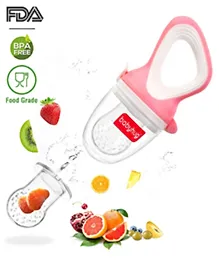
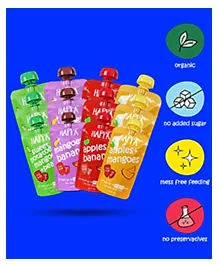
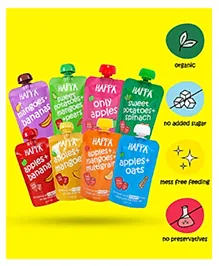

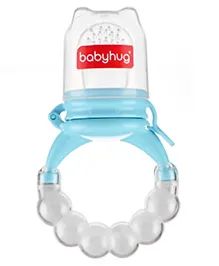
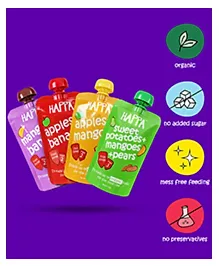
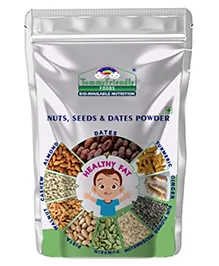
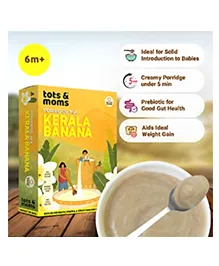
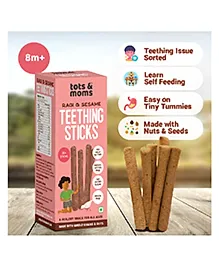

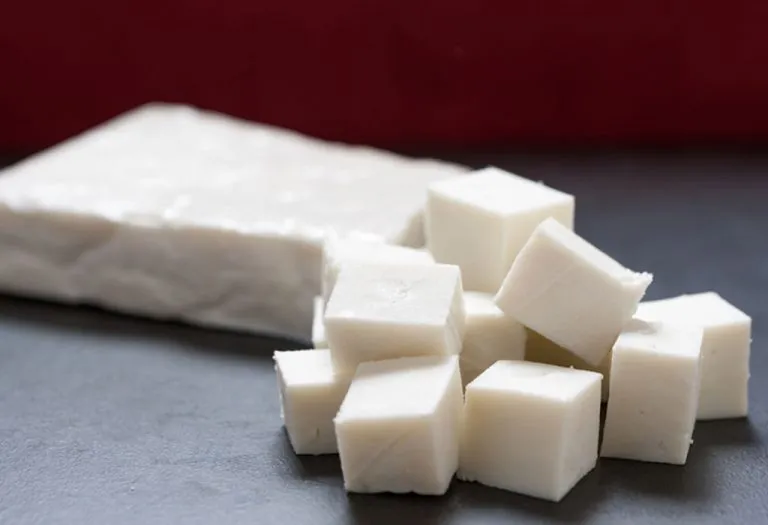


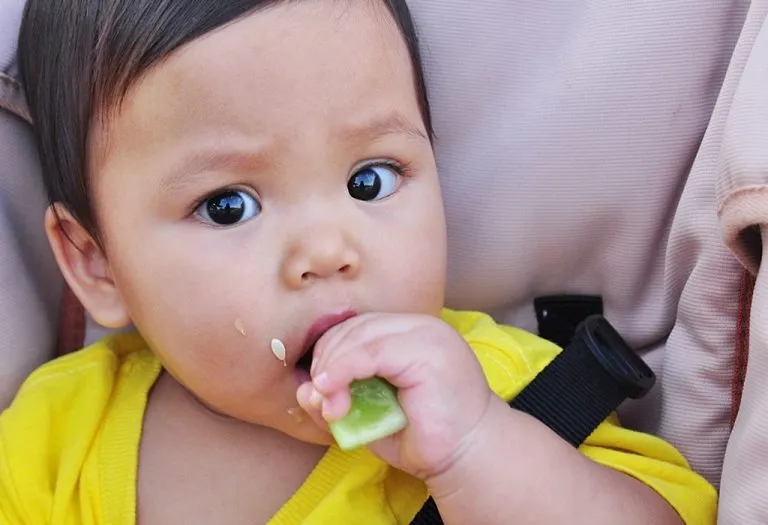



.svg)


















